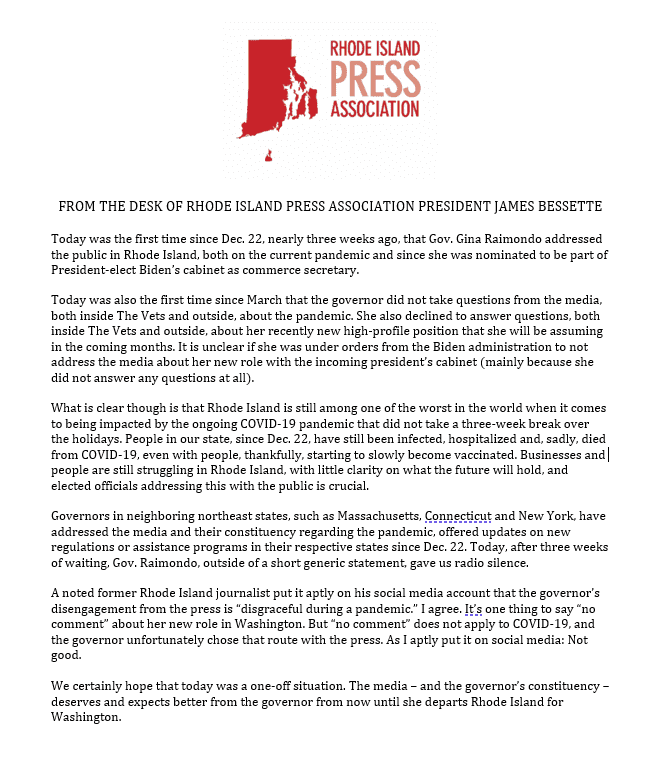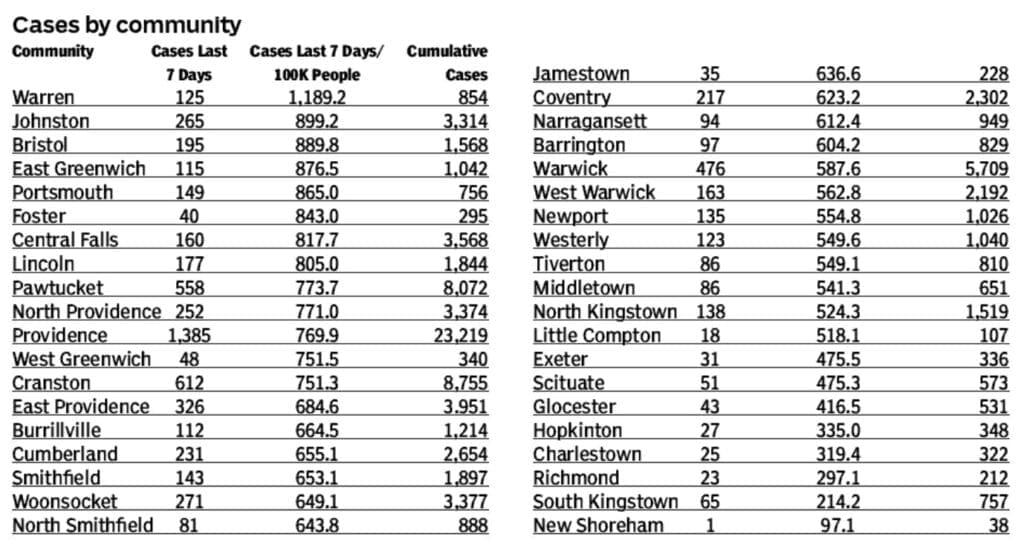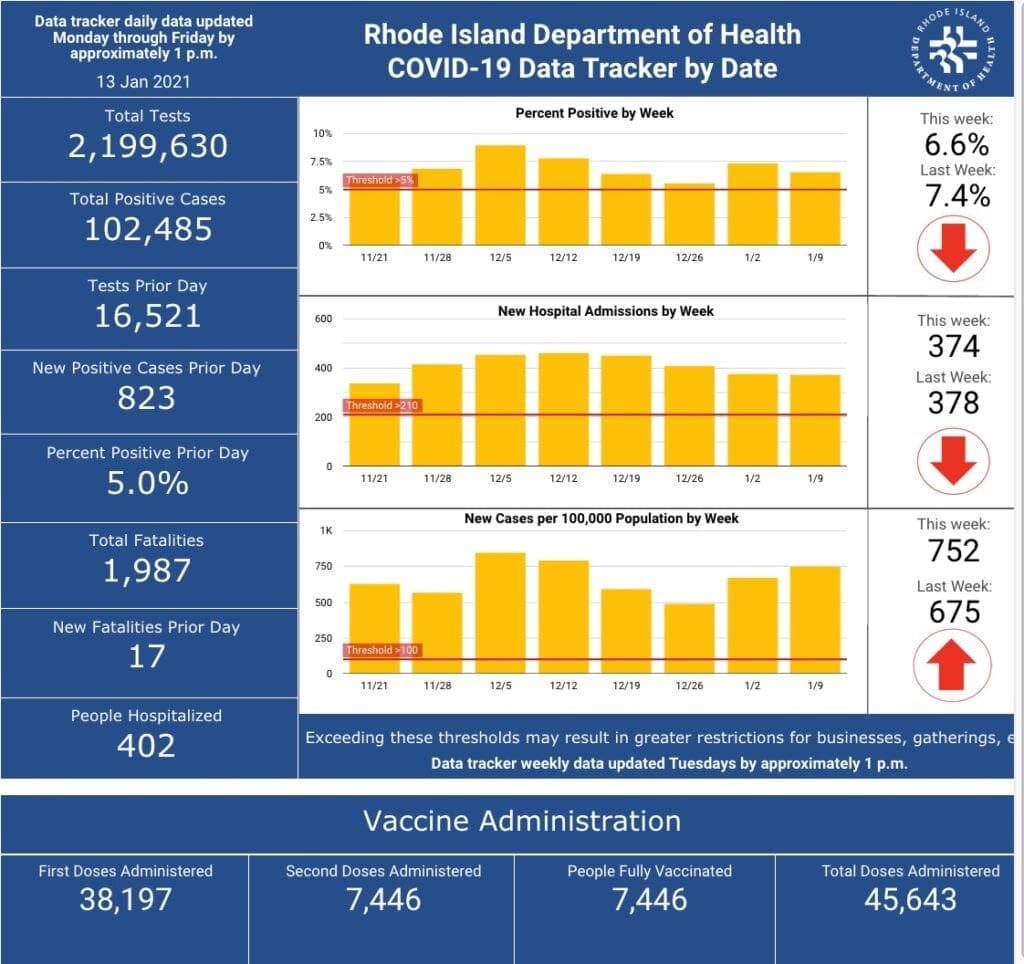Search Posts
Recent Posts
- Rhode Island Weather for June 5, 2025 – Jack Donnelly June 5, 2025
- RI Veterans: Did you know? 05.06.25 (Rental help, events, resources) – John A. Cianci June 5, 2025
- We Cook! Mill’s Tavern Rosemary-Lemon Statler Chicken, Yukon Golds, Haricot Vert and Dijon Demi June 5, 2025
- ICE arrests nearly 1,500 in Massachusetts. First part of “Operation Patriot” – Nantucket Current June 5, 2025
- Rhode Island Weather for June 4, 2025 – Jack Donnelly June 4, 2025
Categories
Subscribe!
Thanks for subscribing! Please check your email for further instructions.

Your Coronavirus Update – Today, Jan. 14, 2021
Photo: Gov. Raimondo’s last press conference on COVID19 crisis
Today’s Press Conference was unusual in that the Governor refused to take any questions and left immediately after speaking – she would not take questions outside as well. Media were left surprised and several stories have been done about this. Yesterday, the RI Press Association, representing newspapers and media outlets in RI issued this statement sent out by James Bessette, President of RIPA:

Coronavirus Update…
RHODE ISLAND & VICINITY
COVID-19 Vaccinations Begin In Mass. Addiction Treatment Programs
Most new COVID-19 infections in North Adams, Ma linked to restaurants
Massachusetts will start administering the COVID-19 vaccine Monday to the more than 94,000 people who live and work in congregate care settings such as prisons, shelters, and certain private special education schools.
Connecticut is authorizing vaccines to begin on those 65 and over.
Maine’s vaccination plan will be updated to follow new federal guidelines recommending states prioritize residents 65 and older. Maine has the nation’s oldest population.
Worcester students will not be returning to the classroom until March at the least.
Rhode Island has “lost” 2.59% of its public school students, or 3,937 children (141,000 students are enrolled in the state). Homeschooling or opting out of preschool or kindergarten are factors.
Worcester students will not be returning to the classroom until March at the least.
All RI state-operated COVID-19 test sites will be closed on MLK Day, Monday. Regular hours of testing will resume on Tuesday, January 19.
The USDA Food and Nutrition Service recently granted Rhode Island approval to again issue Pandemic-EBT benefits to Supplemental Nutrition Assistance Program (SNAP) and non-SNAP households with one or more school-age children who receive free and reduced-price meals at school through the National School Lunch Program, but were unable to receive those meals at school due to the COVID-19 pandemic. Students are entitled to this benefit if the school is closed or has been operating with reduced attendance or hours for at least 5 consecutive days in the current school year.
Gov. Raimondo’s address:
Inauguration is a week away – Senate confirmation takes place after that. I remain as your Governor until the moment I am confirmed. I have daily phone calls with leaders of the state on our COVID response team. We will not miss a beat. We have a well-oiled machine in RI. Have every confidence in Lt. Gov. McKee stepping up on day one. We are planning a seamless transition. I’ve asked McKee to keep the COVID team in place and he has agreed.
Today is the 125th time I’ve done personal updates on COVID in RI. Going forward I’ll continue the weekly briefings and daily emails. Format will change. Dr. Scott and her team will continue multiple updates and a vaccine-specific briefing every week, and a general update every Thursday at Vets Auditorium.
Data review – we’re on a good path – plan for future is to stay the course. No backlog in contact tracing and testing is good. No backlog in K-12 tracing. Ramped up in quarantine and isolation supports.
Extending current guidance through mid-February – re-upping executive orders.
School sports – existing guidance impacts school sports – more guidance coming next week.
K-12 – key is to get tested often. Massive ramp-up in testing in schools.
All teachers, all children. We want to build confidence that schools are safe.
More drive-thru rapid testing sites w/results in 15 minutes are being launched.
Working with companies to bring testing to businesses. Ramping up testing in neighborhoods.
Dr. McKee addressed the group.
Governor has done a great job. Worked hard to keep us safe.
Says he is in a good spot for a transition. Transitions are not new as he has done this several times. Understands the dynamics. Only room for one Governor at a time.
This is one of the most difficult economic and health crises that our state has ever seen. Thanked health workers for saving lives. Small businesses are struggling as never before.
Leaves podium saying press can see him outside – and will have an event for press tomorrow.
Dr. Scott:
Vaccination update:
RI is not receiving a lot of vaccine supply. We are doing the best that we can with what we have. CDC posts a map that ranks states per 100,000 people – RI is near the top. Be assured that when we receive the vaccines our system can deliver them.
14,000 doses a week is received. Tiny fraction. Specific requirements within that set of allotments. 2,000 doses are getting out each day. We are administering almost all of what comes in each week.
RI can’t have crowds of people showing up (stadiums, mass vaccination) because of COVID.
72,175 doses received total to date. 16,757 went straight to CVS/Walgreens.
This week vaccinations: nursing homes by pharmacies; By end of week all nursing homes would have been visited at least once. Working on a total of 3 visits.
Hospital workers – now receiving 2nd dosages.
Urgent care/respiratory clinic staff – “swabbers” – being done now.
Clinics for EMS, school nurses, etc. are being held.
RI National Guard is operating a clinic at Sockanosset for other medical staff.
Central Falls is continuing some additional vaccinating.
Next Week: 1/18: continuing with groups, based on supply in hand. One big change is group home vaccinations will start – 65+, elderly in facilities, assisted living. Majority will be used for assisted living facilities. Also will do outpatient providers (doctor’s office, dentist’s office, behavioral healthcare providers). This phase will continue for several weeks.
Older adults – broaden out from here. Residential units first. Need to take an incremental approach because of the large size of population and limited vaccine supply.
Next month – all older adults 75 and up.
Federal govt says vaccinate over 65: RI agrees, but limiting factor is delivering of vaccine. How will that change when deliveries change? We will change, too.
For those over 65 – 190,000 people. It is challenging to move faster than what we are doing right now. Waiting on supplies. We don’t want to be irresponsible in communicating.
Other states have approached it differently. They have run out, long lines, etc.
Many states have a lot of confusion and disorganization. We are vaccinating incrementally and thoughtfully. Tremendous demand right now.
There are no waitlists. No vaccine sitting on a shelf. When we get more they will let us know.
Q&A:
Dentists: Why waiting for vaccinations? They are a priority group. We’ve not seen transmission at all – kudos to them, and PPE precautions. Top of the list.
What will we do when supply dramatically increases? RI is prepared; partnerships are ready. Still waiting on 2nd dose supplies to be part of that, too.
Why wouldn’t Gov take questions? Others can handle it. Dr. Scott is the point person going forward.
Pawtucket schools’ closing: they say it is not safe. Should they get vaccinated? Unfortunate interpretation of school people in the city – we have tried to reassure the teachers, and parents.
When will someone in senior government answer to us about failing businesses aroumd us – with this complete vacumn in leadership? We have been following up and directing local and federal funds. Didn’t you just hold on to money that was available to them months ago and now it is a sock-through to them?
Vaccine rejection rates: 56 of 84 nursing homes have been visited at least once. We will go back for 3 total visits. After that we will assess picture of acceptance.
Rhode Island Data:

Today’s Data – Jan 13, 2021
Deaths: 17
Tests – 16,521 – Positives – 823 – Percent positive – 5%
Hospitalized – 402 – In ICU – 49 – Ventilated – 35 –
Deaths in hospital – 9 –
New Admissions – 56 – New Discharges – 50
Vaccinations – 1st: 38,197 – 2 shots: 7,446 – Total Vaccinated: 45,643

Dr. Ashish Jha, Dean of Public Health at Brown University has a plan for vaccination – his op-ed in the New York Times. We reprint it, here:

The miraculous development of two Covid-19 vaccines offers us a real chance to end the pandemic in 2021. However, with a limited supply, a halting rollout and the threat of an even more contagious version of the virus now in the mix, the debate over who goes first has become increasingly contentious.
There are plans that try to take into account the disproportionate toll of Covid-19 on people of color, the inability of certain workers to avoid exposure, and the higher risk of illness and death in the elderly and in individuals with underlying health conditions.
But in their well-meaning effort to achieve equity and fairness, these plans threaten to become excessively complex — and thus ripe for manipulation by the privileged, including myriad interest groups that are vying for a place at the front of the line. This would only sow distrust in the broader public.
We suggest a more straightforward approach. By the end of January, we should be done vaccinating health care workers and long-term-care residents. Then we should vaccinate all people over 55, from oldest to youngest, a group of approximately 97 million that accounts for the vast majority of Covid-19 deaths.
Then, to determine the order for the remaining 150 million or so American adults, use a lottery.
Lotteries are hardly a perfect way to distribute vaccines. But, as Winston Churchill might have said, it’s the worst system except for all the others.
The current plans to vaccinate essential workers and people with medical conditions early have obvious merit. But the crucial test of the next few months will not be whether we have devised an allocation system that accurately parses whether a 27-year-old Latino bus driver should go before or after a 52-year-old white store manager with diabetes. The test is whether the system is easy to implement, transparent, broadly acceptable, generally equitable and resistant to abuse.
Already in the past two weeks, vaccine distribution in several top health systems — which enjoy world-class computer systems and have robust human resources departments that can track their employees — have devolved into line-jumping, cheating and noisy protests over who goes first. If vaccinating a few thousand health care workers is this complicated, one can only imagine the chaos in store as we try to vaccinate a few hundred million Americans.
The takeaway is that attempts to prioritize groups by granular categories aren’t just impractical. They’re poised to initiate another wave of injustices and are guaranteed to generate the same kinds of discord that turned face masks into symbols of partisanship.
States are already facing substantial lobbying over which professions should be deemed frontline. If mass transit workers count, what about Uber drivers? Then there’s the practical question of how a pharmacy will determine whether someone truly is a preschool teacher or a grocery store clerk. A note from H.R.? The honor system?
Sorting out existing health conditions is even thornier. There are dozens of varieties of heart failure, diabetes and emphysema. Do they all qualify? Again there’s the matter of documentation — will pharmacies require a physician’s note? What about people who don’t have a regular doctor? Is there any doubt that the system will be gamed, with the advantage going to the privileged?
We should focus on people over 55 instead for two reasons: First, they are dying in the greatest numbers, accounting for 29 percent of the population but 92 percent of Covid-19 deaths. Just as important, it’s operationally simple: Age can be ascertained easily by a pharmacy or hospital, and people are already comfortable with the idea of getting carded. Plus, many essential workers and the vast majority of people with serious medical conditions are in this group.
And for the rest, a lottery, perhaps a national or state-based one that selects a number at random every two weeks, corresponding to the month or last digit of people’s birthdays. Few would love the idea, but it would be equitable and apolitical, and people would know that their number will be called sometime in the next several months.
The oil crisis of the 1970s, when the last number of your license plate determined which days you could gas up your car, provides one model. Odd number, odd days; even number, even days. It was easy to understand, simple to implement, and fair. And it worked.
The United States was traumatized in 2020, not only by a novel virus but also by the bitterness and division that marked our response. We can’t get it wrong again.
NATIONAL & INTERNATIONAL
Gov. Biden will give a coronavirus plan update today.
Moderna believes its vaccine will protect for at least a year.
Delta Dental has offered its 5,000 dentists to provide shots as a possible additional resource, saying they are a cavalry “ready, willing, and able” to serve – also saying they are “fully equipped in their offices or in community settings”.
More than 10% of the US Congress has tested positive.
Portugal has gone into lockdown due to an uptick in cases.
UK may begin using hotels for some patients in need of recovery care.
Rep. Ayanna Pressley and her husband are in quarantine – her husband testing positive.
Rhode Island had administered about 47% of the 80,225 vaccinations it had received, according to the CDC. On a per capita basis, Rhode Island is doing better than most other states, but it ranks second-to-last in New England, behind only Massachusetts.
The University of Vermont has erected two large tents with solid floors, lighting, wiring and propane heaters to give students alternate places to gather to study.
Houston Texans home stadium, NRG Park will be the site of a vaccination drive-thru clinic to vaccinate about 13,000 people who are 65 and older.
Oregon will expand vaccinations to include people age 65 and older, as well as child care providers and early learning and K-12 educators and staff, starting Jan. 23, when additional vaccine shipments are expected to start arriving from the federal government.
In New Jersey, residents 65 and older, and those 16 to 64 with serious medical conditions such as cancer, heart, and kidney disease, can begin to be vaccinated today.
Ontario issues stay-at-home order, extends school closure.
Pharmacy job postings were up 9.7% in December compared to a year ago,
Israel is on track to vaccinate 25% of its population by the end of January and every Israeli by the end of March. To reach herd immunity goals, it must also vaccinate Palestinians, which presents a political quandry.
Today’s end of the press conference…
#WATCH: Gov. Gina Raimondo declines to answer questions while leaving the COVID-19 briefing. https://t.co/kVwIG5BQUJ pic.twitter.com/woxZ1J37tA
— WPRI 12 (@wpri12) January 13, 2021

I do not understand if we do not have enough vaccines why do we still have some.
I would think if we did not have enough we would have none left because we used up all of our supply??
I want to believe our local government is just inept and not corrupt, but over these last 8 months it is hard to believe that somewhat intelligent people are this inept, which leads me to believe they may be corrupt based on a political agenda.
And me thinking things will run better under Dr McKee is just a pipe dream.
This is changing by the day – so stay tuned. Right now the policy has been to hold back the 2nd shot in storage – the feds are now saying, not to do that, to distribute them all.